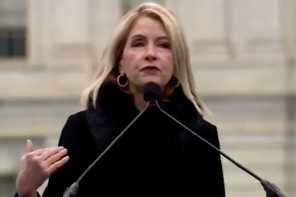Susan Jacoby, in her final On Faith article at WashPo wrote of American atheism’s identity crisis. In it she rightly calls for atheism to reject the religious right’s emerging ideal of religious liberty, which is “liberty only for themselves.” Instead it should look to the founders’ broader notion of religious liberty, which not only gives all believers the right to “believe and proselytize as they wish without government interference” and secures “the rights of minority religions and of those who do not believe in any religion to be free from harassment by a state-favored religious majority.”
She is exactly right about this. But there are problems, she says. One impediment to moving this agenda forward is the cartoon version of atheism many Christians—many of whom are in power these days—carry around with them. It is indeed a serious issue. The stereotype, held by many religious believers, of “atheists [as] bloodless elitists (never honest Christian folk) who substitute science with a capital ‘S’ for God with a capital ‘G,’” is untrue, and therefore damaging to all involved.
Of course I don’t agree with Jacoby about God or religion or science, but I probably don’t agree with her about a lot of other things either. And whether or not I agree with her is not the point. The point is, as anyone who reads Jacoby regularly knows, this stereotype is simply false. She is brilliant, funny, compassionate, and—yes—spirited, and anything but bloodless or elitist.
But reading an atheist, even one as thoroughly human as Jacoby, is not the same as knowing an atheist. This is hard to remember in this Age of Virtuality, but it’s true: the more actual, three-dimensional face time you have with people who are “different” than you, the more difficult it is to keep them in a box. It’s actually that simple, and we all know it.
It’s not a one-way problem, of course. American secularists are as prone to groupthink as any other segment of society. They are just as likely to relate only to each other and mischaracterize religious people as knuckle-dragging morons as religious people are to talk among ourselves about their bloodless elitism.
But because power in America sits with the religious, we have a special burden to know the minority. After all, it’s not just a demand of basic fairness, but of our religious traditions which remind us: It is often those at the edges who speak the truth most clearly.
So I guess this is an unironic new-year call for religious believers to get to know—personally—more atheists and secularists. Cyberspace is good for some things, but not for actual human encounter. And it’s in actual human encounter that the world changes.




